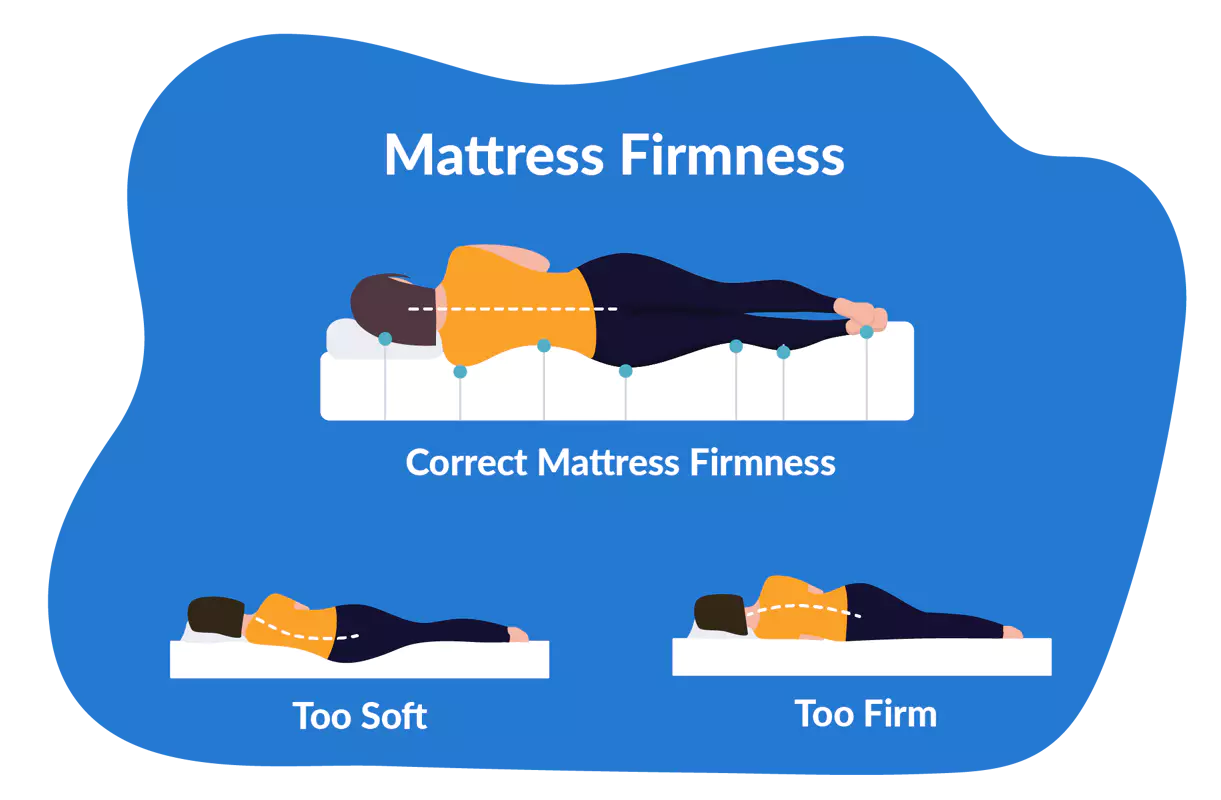Selecting the right mattress firmness is essential for a good night’s sleep, and it’s not just about personal comfort—it’s also about ensuring proper support for your body’s needs, which can change over time. Factors such as your age, body weight, sleeping position, and lifestyle all play a role in determining the ideal firmness level.
At BedStory, we understand that choosing the right mattress can significantly impact your health and well-being, which is why we’ve created this guide to help you select the perfect mattress firmness for your age and lifestyle.
1. Firmness and Your Age:
Your age can have a significant impact on your mattress preferences. As we age, our bodies undergo changes that can affect the way we sleep. The firmness level that works best for a young adult may not be suitable for a senior, for example. Here's a breakdown of how mattress firmness needs may vary by age:
Young Adults (18-35 years old):
-
Firmness Level: Medium to Medium-Firm
-
Why This Works: Younger adults typically have more flexibility in their spine and joints, so they may prefer a mattress that offers a good balance of support and comfort. A medium to medium-firm mattress works well for most individuals in this age group, as it provides sufficient support without feeling too stiff. Those with active lifestyles or sports injuries may also benefit from a slightly firmer mattress that supports muscle recovery.
Adults (36-55 years old):
-
Firmness Level: Medium-Firm to Firm
-
Why This Works: As people reach middle age, they often begin to experience back pain or joint discomfort, which can be alleviated by a firmer mattress. A medium-firm to firm mattress offers the right support to maintain proper spinal alignment, especially for individuals with lower back pain or those who experience pressure points. If you sleep on your back or stomach, a firmer mattress helps prevent the spine from sinking too deeply, promoting better alignment.
Seniors (56+ years old):
-
Firmness Level: Medium to Medium-Soft
-
Why This Works: As we age, our bodies tend to become less resilient to pressure, which makes softer mattresses more beneficial for seniors. A medium or medium-soft mattress allows the body to sink just enough to relieve pressure on sensitive areas like the hips, shoulders, and joints. Seniors may also experience reduced circulation, so a mattress with good cushioning helps ensure better blood flow during sleep. Additionally, a softer mattress is often more comfortable for those who suffer from arthritis or joint pain.
2. Firmness and Your Body Weight:
Your weight plays a key role in determining how firm your mattress should be. Heavier individuals may require firmer mattresses to prevent too much sinkage, while lighter individuals may benefit from softer mattresses that contour better to their bodies.
Light Sleepers (Under 130 lbs):
-
Firmness Level: Soft to Medium
-
Why This Works: Lighter individuals tend to exert less pressure on the mattress, so they may prefer a softer mattress that allows for more contouring. A mattress that’s too firm may feel uncomfortable, as it won’t allow for enough give in the foam layers. A softer mattress provides the right amount of cushioning to help relieve pressure points without sacrificing support.
Average Sleepers (130-230 lbs):
-
Firmness Level: Medium to Medium-Firm
-
Why This Works: For people within this weight range, a medium to medium-firm mattress is ideal. It offers the right balance of comfort and support, with enough firmness to prevent sinking while still providing cushioning to relieve pressure on the body. This level of firmness is great for most sleep positions, especially back and side sleepers.
Heavy Sleepers (Over 230 lbs):
-
Firmness Level: Firm to Extra-Firm
-
Why This Works: Heavier individuals generally need a firmer mattress to prevent excessive sinking, which could result in improper spinal alignment and discomfort. A firm mattress ensures proper support and minimizes the risk of the mattress bottoming out. Additionally, extra-firm mattresses are beneficial for heavier sleepers who require more support for pressure points, especially those who sleep on their back or stomach.
3. Firmness and Sleeping Position:
Your preferred sleeping position significantly influences the type of firmness that will provide the best comfort and support. Let’s take a look at how each sleep position interacts with mattress firmness:
Back Sleepers:
-
Firmness Level: Medium-Firm to Firm
-
Why This Works: Back sleepers need a mattress that supports the natural curve of the spine and prevents the lower back from sinking too much. A medium-firm or firm mattress provides the necessary support to keep the spine aligned while still offering enough comfort to relieve pressure in areas like the lower back.
Side Sleepers:
-
Firmness Level: Medium to Medium-Soft
-
Why This Works: Side sleepers tend to put a lot of pressure on their shoulders and hips. A medium to medium-soft mattress allows for better contouring, reducing pressure on these areas while maintaining spinal alignment. A softer mattress ensures that the body can sink into the mattress without feeling unsupported.
Stomach Sleepers:
-
Firmness Level: Firm to Extra-Firm
-
Why This Works: Stomach sleepers need a firm mattress to prevent the hips from sinking too deeply into the bed, which can lead to an unnatural spine position. A firm mattress helps keep the spine aligned, reducing the risk of back pain. For individuals who sleep on their stomach, an extra-firm mattress can be an excellent choice to keep the torso from sinking into the bed.
4. Firmness and Lifestyle Factors:
Your lifestyle, including activity level, health conditions, and sleep preferences, also affects the ideal mattress firmness.
Active Lifestyles:
-
Firmness Level: Medium-Firm to Firm
-
Why This Works: Individuals with active lifestyles, such as athletes, may benefit from a firmer mattress that offers more support for muscle recovery. A firmer mattress helps keep the spine properly aligned and offers better support for the back and joints after a day of physical activity.
Pregnancy:
-
Firmness Level: Medium to Medium-Firm
-
Why This Works: Pregnant individuals often experience back pain and pressure on the hips. A medium-firm mattress provides enough support for the back while offering sufficient comfort and relief for the hips and abdomen. A mattress with good pressure relief is essential to ensure a restful night’s sleep during pregnancy.
Chronic Pain or Medical Conditions:
-
Firmness Level: Medium to Medium-Soft
-
Why This Works: For those dealing with chronic pain conditions, such as arthritis, fibromyalgia, or herniated discs, a softer mattress can help relieve pressure points and improve sleep quality. A mattress that contours to the body can reduce discomfort and provide the necessary support for pressure-sensitive areas.
Conclusion
Choosing the right mattress firmness depends on several factors, including your age, body weight, sleeping position, and lifestyle. At BedStory, we offer a wide range of mattresses designed to cater to different firmness preferences, ensuring that you get the support and comfort that suits your unique needs.
-
For younger adults and active lifestyles, a medium to medium-firm mattress offers the right balance of comfort and support.
-
For older adults, a medium-soft to medium mattress helps relieve pressure and provides extra comfort for sensitive joints.
-
For those with specific conditions, such as chronic pain or pregnancy, softer options may provide the pressure relief needed for a restful night’s sleep.
Understanding your needs is key to making the right decision. No matter your firmness preference, BedStory offers a mattress designed to help you sleep better, feel refreshed, and wake up ready to take on the day.



Leave a comment
This site is protected by hCaptcha and the hCaptcha Privacy Policy and Terms of Service apply.